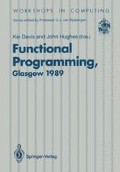Abstract
Type classes were developed in association with the lazy functional programming language Haskell [1] to handle overloading since no satisfactory off-the-shelf solution was available. The motivation and description of type classes is given in [2].
Access this chapter
Tax calculation will be finalised at checkout
Purchases are for personal use only
Preview
Unable to display preview. Download preview PDF.
References
P. Hudak, and P. Wadler (editors), Report on the functional programming language Haskell, Technical report YALEU/DCS/RR656, Yale University, Department of Computer Science, November 1988.
Phil Wadler and Stephen Blott, How to make ad-hoc polymorphism less ad hoc, In Proceedings of the 16’th Annual Symposium on Principles of Programming Languages, Austin, Texas, January 1989.
R. Hindley, The principal type scheme of an object in combinatory logic. In Trans. Am. Math. Soc. 146, pp. 29–60, December 1969.
R. Milner, A theory of type polymorphism in programming. In J. Comput. Syst. Sci. 17, pp. 348–375, 1978.
L. Damas and R. Milner, Principal type schemes for functional programs. In Proceedings of the 9’th Annual Symposium on Principles of Programming Languages, Albuquerque, N.M., January 1982.
Luca Cardelli, Basic polymorphic typechecking, Computing Science tech. report 119, AT and T Bell laboratories, Murray Hill, NJ, 1984.
Kevin Hammond, De-Mysticifying type classes, in Proceedings of the 2nd Glasgow FP group workshop, Fraserburgh, Scotland, 1989.
S. Blott, Thesis, Computing Science Dept., University of Glasgow, (in preparation).
L. Damas, Type assignment in programming languages, Thesis, University of Edinburgh, 1985.
J. A. Robinson, A machine orientated logic based on the resolution principal. JACM 12, 1, pp. 23–41, 1965.
V. Breazu, T. Coquand, C. A. Gunter, and S. Scedrov. Inheritance and explicit coercion (preliminary report), V. Breazu, Department of Computer and Information Sciences, University of Pensylvania, Philidelphia, PA 19104, USA. October 1988.
Author information
Authors and Affiliations
Editor information
Editors and Affiliations
Rights and permissions
Copyright information
© 1990 British Computer Society
About this paper
Cite this paper
Blott, S. (1990). Type inference and type classes. In: Davis, K., Hughes, J. (eds) Functional Programming. Workshops in Computing. Springer, London. https://doi.org/10.1007/978-1-4471-3166-3_17
Download citation
DOI: https://doi.org/10.1007/978-1-4471-3166-3_17
Publisher Name: Springer, London
Print ISBN: 978-3-540-19609-9
Online ISBN: 978-1-4471-3166-3
eBook Packages: Springer Book Archive

